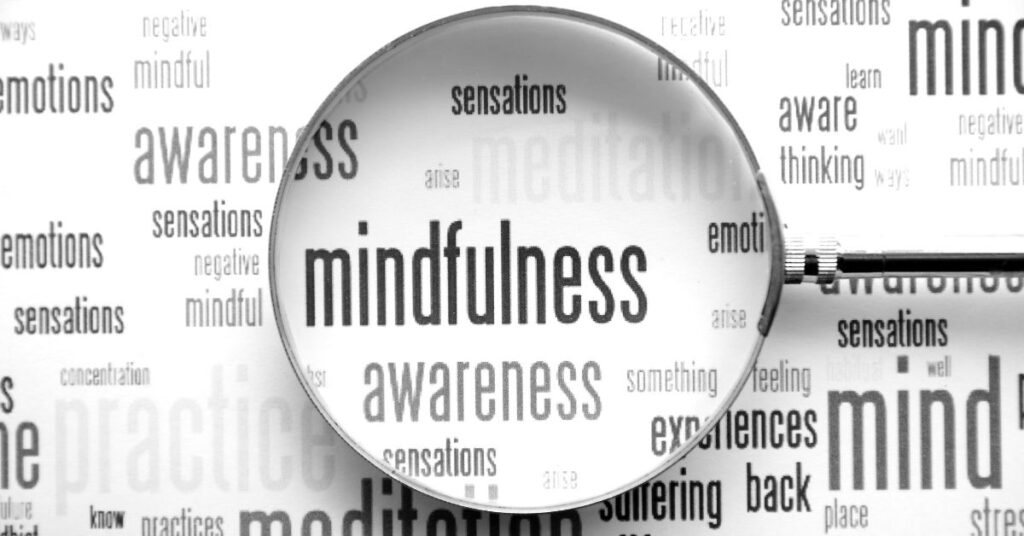As parents, we have all been there. Our minds are thinking about our to-do lists, the doctor appointment tomorrow, your child’s school project, housework that needs to be completed, and more. Constantly thinking about all of those things and not being fully in the present can cause stress and lead to other unhealthy consequences. It’s the same for our children. That is why mindfulness can benefit both our children with autism and ADHD as well as us as parents.
What is mindfulness?

The Oxford Dictionary defines mindfulness as “a mental state achieved by focusing one’s awareness on the present moment, while calmly acknowledging and accepting one’s feelings, thoughts, and bodily sensations, used as a therapeutic technique.”
Many times, people will use mindfulness and meditation interchangeably. However, meditation is one form of mindfulness. There are many others. Examples include:
- Deep breathing
- Focused walk (concentrate on the five senses and what you are seeing on the walk)
- Presence in the moment (focus on what is happening now and quiet thoughts of past or future)
- Progressive relaxation
- Mindful eating (focus on each bite of food, chewing and swallowing it)
Basically, you are quieting your mind and focusing what you feel and notice in the moment. You want to let go of the worry and thoughts not related to that moment. I have found that practicing mindfulness when I am walking or when I notice I am really stressed helps calm me down. When my youngest son was little, he had a hard time calming down and falling asleep. We found the Flop Game, which is a progressive relaxation story that helped him to fall asleep.
Research published in Mindfulness in 2017 found that a mindfulness parallel study in both parents and their children with autism was beneficial to both. For parents, the mindfulness program helped to improve their parenting, increase emotional and behavioral functioning, and also raise their mindfulness in the moment. For children with autism, the study found mindfulness improved their social communication as well as emotional and behavioral functioning. Other mindfulness studies have found similar results.
How can mindfulness help children with autism and their parents?

Children with autism and their parents tend to have a high level of stress and emotions. This is due to the child’s development delays, difficulty with communication, lack of social skills and more. By quieting the mind, both parents and children can find calm in their day. Here are some specific benefits that children with autism and their parents can experience from mindfulness:
1. Reduce stress, anxiety and depression for both children and parents
Studies have found that mindfulness helps reduce stress, anxiety and depression in parents and children. Quieting your mind allows you to take a break from the day’s anxieties and calm your mind and body. Mindfulness is an effective tool for coping with stress.
2. Change your brain to be more attentive and rewired for calm
Research has shown that regular mindfulness activities can help you change your brain so that you pay more attention, regulate your emotions better, are calmer, and more. We have so many distractions in our lives these days, and our brains are adapting to those. By practicing mindfulness, you can rewire your brain to benefit your physical and mental health.
3. Decrease aggression
Several studies over the past decade have shown that mindfulness techniques can reduce aggression in children with autism. This included verbal aggression, physical aggression and self-harm. Some studies focused on teaching parents mindfulness and resulted in improved parenting skills. Other studies focused on mindfulness activities directly practiced by children and adolescents with autism.
4. Build self-regulation skills
Mindfulness helps children and parents better self-regulate their behaviors. Studies showed that mindfulness helped to reduce impulsiveness and increase attention, which enabled the ability to better deal with regulating feelings and challenging behaviors.
5. Improve your relationship with your child
Many studies showed that mindfulness activities in children with autism and their parents helped them interact with each other better. Parents were able to provide more mindful parenting, which also led to better relationships with their children.

Daily mindfulness exercises
Regularly practicing mindfulness is the best way to obtain the benefits above. Even practicing one daily exercise can lead to positive results. Need some ideas? Try these exercises.
1. Soles of the Feet
This mindfulness exercise was created by researchers for children with autism to deal with their anger or aggression from an incident.
- Have your child either stand or sit. If standing, have your child stand naturally with their feet flat on the ground. If sitting, have them sit comfortably in a chair with the soles of their feet flat on the ground.
- Ask your child to breathe naturally and try to think of nothing.
- If they are feeling anger, ask them to let the anger just flow through their body.
- Now, have them focus on the soles of their feet. Move their toes, feel the texture of their socks, shoes or the floor or carpet.
- Tell them to keep breathing and focus on the soles of their feet until they feel calm.
- Once they are calm, they can walk away.
2. Progressive Relaxation at Bedtime
This exercise will help your child (or you!) relax at bedtime.
- Lay down and lie on your back in comfortable position. Breathe naturally.
- Start at the head and have your child tense their forehead, eyes and mouth for a count of four to 10 and then relax for 10 to 20 seconds before moving onto the next muscle group.
- Move to the shoulders, fists, stomach and then legs and feet.
- When your child is finished, then count backwards from five to zero.
3. Notice Five Things
This exercise will help you and your child focus on the moment and your surroundings.
- Sit with your child.
- Tell your child five things that you notice from your current surroundings. Use your five senses.
- Then ask your child to tell you five things they notice in your current surroundings.
Want more ideas for mindfulness exercises and games for your child? Check out this Positive Psychology article. I also used the Indigo Dreams CD (affiliate link) for my son when he was young, which helped him to calm down and fall asleep.
Have you tried practicing mindfulness yourself or with your child with autism? What are your tips and what has worked best for you and your child? Leave a comment so that we can share and encourage each other on this journey.








